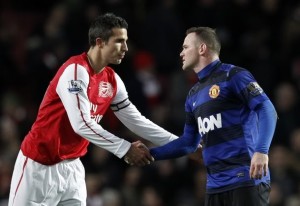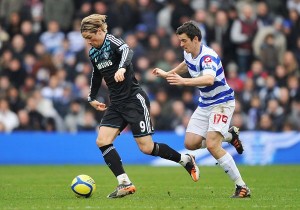“I know my statistics at Chelsea have not been the same as in other years in my career. But I am fighting to get back to those statistics and I will never, ever give up. I will try my heart out for this club. There are too many things I have to give back to these people and I want to show my thanks to them.” – Fernando Torres (Sky Sports)
4 Things To Know About Demba Ba to Chelsea

It’s finally official – Demba Ba has joined Chelsea. Here are four things to know about the new Chelsea striker:
1. His finishing is world class – So many Chelsea fans have been frustrated by the finishing of current Chelsea strikers (mainly Fernando Torres). Here’s a direct comparison of Ba and Torres in the Premier League since Torres joined Chelsea and Ba joined the league initially with West Ham…
| Striker | Minutes played | Goals | Minutes / Goal |
|---|---|---|---|
| Torres | 4390 | 14 | 314 |
| Ba | 5321 | 36 | 148 |
Sure, Torres has made more substitute appearances, but the fact that Ba has a goals per minute ratio that is 166% LESS than Torres clearly highlights the prowess of Ba in front of goal and the poor form of Torres at his time with Chelsea.
—
2. Ba scores in a variety of ways – Ba is right-footed but he can score in every way imaginable. Below is a comparison of the the Premier League goals scored by Ba and Torres…
| Striker | Right Foot | Left Foot | Header |
|---|---|---|---|
| Torres | 9 | 2 | 2 |
| Ba | 15 | 5 | 10 |
| Striker | Penalty | Free Kick | Tap-In |
|---|---|---|---|
| Torres | 1 | 0 | 0 |
| Ba | 3 | 2 | 1 |
It’s pretty remarkable to see that 64% of the goals Torres has scored for Chelsea in the Premier League have come with his right foot, whereas only 41% of Ba’s Premier League goals have come with his dominant right foot. Ba is a striker who is not only superior in the air compared to Torres (who has improved here recently) but also appears to have a stronger weaker foot than Torres for scoring goals.
—
3. He’s from France, NOT Senegal – Demba Ba may represent Senegal at the international level due to his heritage but he is actually from Sèvres, France. He grew up in France, playing football at the youth level for a variety of French clubs before getting his first chance with French club Rouen. To dispel whatever misconceptions some people may have he is as European as strikers come.
—
4. His knee “concerns” haven’t caused him to miss games – Much has been made about Demba Ba’s knee and his past failure of a medical for Stoke City before joining West Ham. Certainly he is not a model for a healthy footballer (few will dispute that) but the fact is that Demba Ba hasn’t missed serious game-time since the 2009-2010 season. His knee, or any other injury for that matter, has not been a serious concern in his 71 appearances for West Ham or Newcastle.
—
In short, Demba Ba on paper is a great acquisition for Chelsea. On a club with two of the best and youngest creative players in the world (Juan Mata and Eden Hazard) Chelsea don’t need a striker who is looking more to set up others like Torres often is, they need a striker to put the ball in the back of the net from inside the penalty area. Demba Ba’s is the guy to fill this need.
The Radamel Falcao Transfer Saga Survival Guide
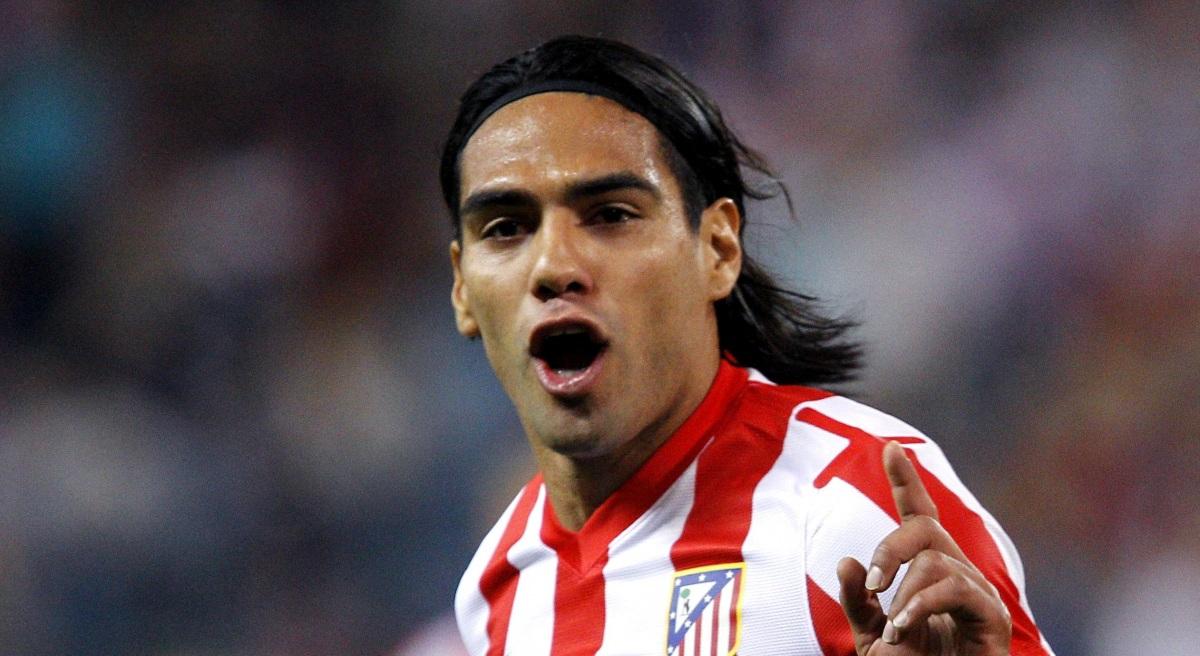
Who is Radamel Falcao?
Falcao is a 26 year old striker from Santa Marta, Colombia who currently plays for Atletico Madrid. Listed at only 5′ 10” (1.78m) tall, he does not look physically imposing to his opponents nor much of an aerial threat. Neither could be further from the truth.
What kind of player is he?
When people think of Radamel Falcao one word comes to mind – goals. Lots of goals, scored with his head and both feet. He is one of the most complete strikers in the game today.
Here’s a comparison of Falcao’s time in Europe compared to some of the other well-known strikers in Europe…
Falcao for Porto and Atletico (competitive matches): 145 appearances, 11,763 minutes played, 117 goals, 25 assists. A goal every 101 minutes.
Edinson Cavani for Palermo and Napoli (competitive matches matches): 225 appearances, 17,536 minutes played, 116 goals, 29 assists. A goal every 151 minutes.
Fernando Torres at Chelsea (all competitive matches): 83 appearances, 5,427 minutes played, 18 goals, 21 assists. A goal every 302 minutes.
Didier Drogba at Chelsea (all competitive games): 337 appearances, 25,265 minutes played, 155 goals, 85 assists. A goal every 163 minutes.
As you can see, Falcao is clearly scoring goals at an unreal rate far above his direct competition in the transfer market (Cavani, although he has been more prolific for Napoli than Palermo) and legendary strikers (Drogba). At the current rate Torres is scoring for Chelsea he would need to log approximately another 30,000 minutes at Chelsea to reach Falcao’s current goal total of 117. That’s roughly 5,000 more minutes than Didier Drogba played during his entire career at Chelsea.
Why would Atletico Madrid want to sell him?
I have never been a person to propagate a lot of transfer speculation – I’m a facts and stats guy. But when the line blurs it makes reaching conclusions easier.
Last season for Atletico, Falcao was unstoppable in the Europa League, having scored 12 goals in 15 appearances and ultimately leading the Spanish club to the Europa League title. This wasn’t a big deal though for the Colombian, nicknamed El Tigre (the Tiger), as all he did the previous season with Porto was score 17 goals in 14 Europa League games to break Jurgen Klinsmann’s scoring record in a European league (15 goals).
What am I getting at? With arguably the most successful player in the history of the Europa League on his roster, Atletico manager Diego Simeone has omitted Falcao from all four Europa League matches Atletico has played in this season. While some Atletico fans are adamant Simeone is resting key players such as Falcao and Arda Turan (another transfer target who has been omitted from every Europa League match), key players such as Miranda and Francisco Juanfran have appeared in the competition. When asked about these decisions, Simeone responded rather defensively, saying: “I am the coach – I do not have to explain my decisions. I do what I have to so we are competitive in three competitions.”
With Atletico having serious debt concerns, including debts of over €100 million to the Spanish treasury who is already struggling in a weak Eurozone economy, it’s hard for me to believe an asset such as Falcao is purposely rested when playing him in a Europa League match would significantly reduce his value on the January transfer market.
Why does not playing Falcao in the Europa League increase his value?
Easy question, but not really. Looking at the UEFA Regulations regarding January squad registrations you will find the following rules…
17.17 – For all matches from the start of the first knockout round, a club may register a maximum of three new eligible players for the remaining matches in the current competition. Such registration must be completed by February 1. This deadline cannot be extended.
17.18 – One player from the above quota of three who has played UEFA club competition matches for another competing club in the current season may exceptionally be registered, provided that player has not been fielded:
– in the same competition for another club
– for another club that is currently in the same competition.
To explain further, this means if a club like PSG makes it into the knock-out stage of the Champions League they could register 3 new players for this stage which were not a part of their group stage squad. Of these players, only ONE could have played in a European competition earlier in the season.
Hypothetically speaking, say PSG are offered both Wesley Sneijder from Inter and Falcao this winter. Because Sneijder has already played in the Europa League, he would need the one exception spot offered by UEFA to play for PSG in the Champions League. If Falcao has not played for Atletico in the Europa League, the club could sign both players and add them to their Champions League squad (along with Lucas Moura in the final spot), but if Falcao did play in the Europa League then PSG would need to choose between Falcao and Sneijder for their squad. Thus if Falcao does not play in the Europa League, more teams will be interested in his services which will only drive up the price of his transfer fee.
—
In short, there are multiple reasons why Radamel Falcao could be sold in the summer that actually make sense. Falcao’s goal rate is currently so amazing in Europe it will likely get worse over time, meaning Atletico should sell now to get the most money for him and reduce their debts (thus reducing their loan interest as well). Couple this with Falcao still being on the market without requiring a special UEFA exception to play in the Champions League and it only compounds the appeal to clubs who will be tempted by his goal scoring efforts. Whether it’s PSG, Chelsea, or another club, we can be sure the Falcao speculation won’t be letting up anytime soon.
Torres Explains His Nickname
“I remember when I first came to Liverpool, Pepe Reina helped with everything and he made it easy for me. When I was Atletico Madrid captain I tried to help everyone. These are the basics in football, you need to create an atmosphere and try to create a group of friends. It’s not easy and it doesn’t always happen but you have to try. It’s what I learned when I was 16 and arrived in Atletico’s dressing room, nobody wanted to talk to me because they were threatened. They called me ‘El Nino’ because nobody knew my name. I didn’t like it and it shouldn’t be like that, but dressing rooms are very complicated with players coming from different parts of the world and with different roles.” – Fernando Torres (Official CFC)
Are Chelsea Fans Too Quick to Criticize Fernando Torres?
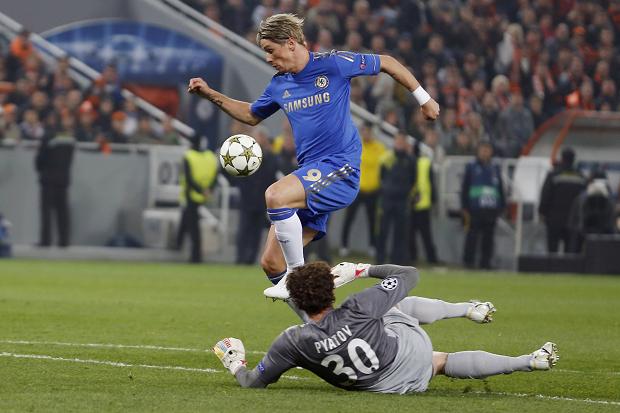
Before I start, let it be known that I have tried to remain extremely objective surrounding Fernando Torres. I have written both negative articles and positive articles about his performances last season. I am not one of those people who supports Torres unconditionally because of his looks or any other reason.
With that said, Torres was awful against Shakhtar in the Champions League as Chelsea lost 2-1 in Ukraine. He was substituted off by Roberto Di Matteo after 70 minutes and rightfully so – he provided only one real shot on goal and lost the ball eight times to Shakhtar defenders. It was the worst performance for Torres this season.
Chelsea fans were brutal regarding his efforts after the game – “He’s horrible” “Need to sell him immediately” “Bench him for Sturridge and don’t look back”. By now with Torres, I’m used to comments like these and I really don’t think too much about it – but after this match in particular it is quite unfair to single out Torres. Oscar misplaced too many passes against Shakhtar and the game looked bigger than him at times. Hazard had several chances and weakly shot the ball on goal to be easily saved on multiple occasions. Mata was brought back down to earth and wasn’t nearly as much of a factor as in recent games. Petr Cech needed to make 9 saves, some incredible, to keep the game from getting out of hand and to maintain Chelsea’s respectable goal difference. It was a bad game for most members of the Chelsea squad, not just Torres.
So why does Torres get so much of the blame? Here’s why I think it’s unfair…
- Torres has FINALLY started scoring goals – Chelsea fans waited so long for Torres to score goals and now he finally is with 7 goals in his last 11 Premier League starts. Any manager in the world would love a striker who scores at that rate and it’s certainly a reason why Chelsea are at the top of the table. Sure he misses chances, but all strikers do, including Didier Drogba (who only had 5 Premier League goals last season).
- Torres has been very smart about his shot selection – While people point to his missed chances it’s somewhat surprising to note that Fernando Torres actually has taken only 17 shots to score his 4 Premier League goals this season. Compare that to the likes of “better” strikers such as Luis Suarez (5 goals, 50 shots) and Jermain Defoe (5 goals, 43 shots) and it makes Torres look significantly more clinical when he does decide to pull the trigger.
- Torres “leads” the second best attack in the Premier League – With 19 goals scored this season Chelsea have the second best attack in the Premier League – it’s honestly hard to complain about that. Obviously the goals and smart shot selection from Torres helped to reach this goal total but his ability to run and create space for the attacking trio of Mata, Oscar, and Hazard has been under-appreciated and doesn’t show up in the stats.
In short, Torres may get a lot of the blame when Chelsea loses and sometimes he deserves it. But when the opponent destroys Chelsea on both ends like Shakhtar did in the Ukraine it’s unfair to single out one player, basically as a result of habit, when he has been playing quite well in previous matches.
Rooney and Van Persie: Strengths and Weaknesses
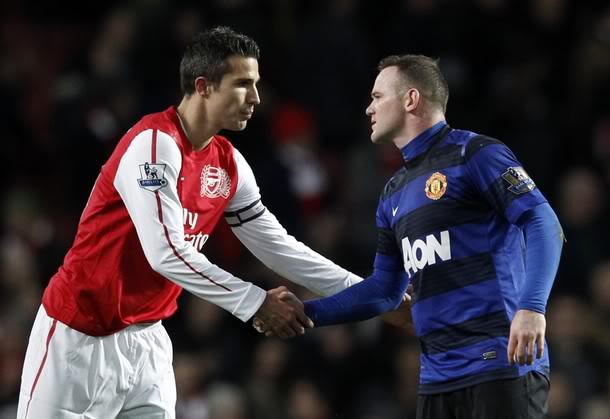
[tweetmeme]
The signing of Robin van Persie by Manchester United is a move that shocked the football world and creates one of the most famous striker partnerships on the planet. But, as we’ve all seen with Didier Drogba and Fernando Torres, sometimes pairing two superstar strikers together doesn’t work out.
Here are some of the expected strengths and weaknesses of the tandem…
Strengths:
- Finishing – Combining the Premier League scoring totals of Rooney and Van Persie from last season you get 57 goals in 72 appearances or a combined goal scoring ratio of 0.79 per game. With 57 goals combined between the two strikers that’s more goals than fifteen Premier League teams scored last season.
- Passing – What elevates Rooney and Van Persie above the likes of Darren Bent is their ability to not only put the ball in the back of the net but also create for others. The two player combined for 13 assists last season and Van Persie led all strikers with 92 chances created (Rooney was fifth with 51).
- Experience – This is a strength few are talking about as the Premier League is one of the most difficult leagues in the world to adapt to. Van Persie joins United with over 13,000 minutes played in the Premier League – when coupled with Rooney’s vast experience (over 24,000 minutes played) you’re looking at one of the most experienced front lines in the league.
Weaknesses:
- Aerial ability – Despite Van Persie’s height (188cm – 6’2″) he cannot jump very high and has poor timing with headers, a flaw which some believe holds him back from being the best striker in the world. Rooney has natural instincts in the air but is much shorter (177cm – 5’9″) meaning he cannot compete aerially on a consistent basis with some of the taller Premier League defenders.
- Formation limitations – Alex Ferguson is a manager who likes to mix-up formations, tactics, and personnel based on his opponent. Unfortunately for him both Rooney and Van Persie are almost exclusively players who play in the center of the pitch (Rooney started one match out right last season). This means formations such as 4-3-3 are likely out of the question with both players on the pitch.
- Direct play – Long gone are the days of heaving the ball up to Dimitar Berbatov. With the addition of Shinji Kagawa we can expect United to rely on intricate build-up play between the Japanese star, Van Perise, and Rooney. The Red Devils may struggle this season to unlock teams who crowd the middle and force United to play out wide and attempt long balls forward.
In short, while the dynamic duo of Van Persie and Rooney seems like a goal scoring machine there are some drawbacks to the partnership. Both players were 1-2 in shooting in the Premier League last season and combined to shoot 331 times, although this season’s number will likely be lower when they’re wearing the same shirt.
How will both players who are so used to the ball being at their feet in goal scoring positions play when it’s only their half as much? Poorly in the case of Drogba and Torres, let me know below with your thoughts on Van Persie and Rooney…
Drogba encourages Torres moving forward
“It has been difficult for him, but he has showed he is the man. Next season is going to be his season. We have a good relationship. We don’t understand why we didn’t play together more, but that’s the past. Torres is the future.” – Didier Drogba (Eurosport)
How Roberto Di Matteo Revived Fernando Torres
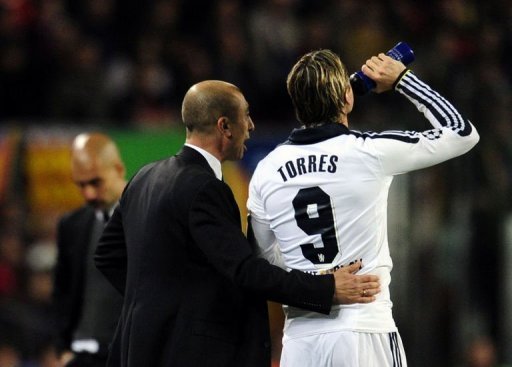
[tweetmeme]
Fernando Torres is in the best form of his Chelsea career. The magnifying glass has been squarely on Torres since he made the record £50 million switch from Liverpool to Chelsea, mainly due to his lack of goals at Chelsea and in particular his streak of over 1,000 minutes without scoring for the London club (which some may argue had a hand in the demise of AVB). While I have done some analysis of the impact of Torres in the past it’s clear to me there has been a change in Fernando Torres since Roberto Di Matteo has become the manager of Chelsea. Let’s see the effect Di Matteo has had on Torres…
In his 14 appearances under Roberto Di Matteo, Torres has played 882 minutes contributing 7 goals and 4 assists (a goal OR assist every 80 minutes)
In his 31 appearances under Andre Villas-Boas, Torres played 1946 minutes contributing 4 goals and 8 assists (a goal OR assist every 162 minutes)
In his 18 appearances under Carlo Ancelotti, Torres played 1012 minutes contributing 1 goal and 2 assists (a goal OR assist every 337 minutes)
The level of performance Di Matteo has been able to get out of Torres (and the whole Chelsea team) has been astonishing. Here are a couple key changes Di Matteo has implemented which have given Torres life once again…
- The 4-2-3-1 formation – Although Chelsea do revert back to 4-3-3 or other formations occasionally this has been Di Matteo’s main tactic. Coincidentally or not on his part, it’s the exact same formation which made Torres into the star he is today at Liverpool. Similar to the Liverpool of old, Di Matteo has his Mascherano (Mikel) and has somehow morphed Frank Lampard into the playmaking deep midfield player that Xabi Alonso was. While Mata isn’t as physical as Gerrard, his passing is superb just like the Gerrard of years past. With familiarity brings comfort and Torres has looked calm and relaxed playing for Di Matteo, knowing his role and finding himself out of position less and less.
- Less Malouda, More Kalou – AVB clearly favored Malouda, a player criticized by Chelsea fans for not passing the ball to Torres altogether (untrue) or in places where he has a chance to score (true). Kalou although a forward converted into a winger often looks to cross less (a strength of Malouda-Drogba combination but not Malouda-Torres) and instead looks for the low through ball behind the defense that Torres prefers. In fact, Di Matteo has almost fully removed Malouda from the more attacking positions AVB placed him in and has pushed him either more central or to the bench altogether (he’s only started two matches under Di Matteo).
Although the majority of Chelsea fans have backed Torres from the start it’s nice to see him do well with the club and it makes the moments he scores even sweeter for the fans who have supported him from the beginning. Predicting the future of Torres at Chelsea is difficult given the uncertainty of the Chelsea managerial position but one thing is appearing more and more likely – Chelsea fans will be able to watch Fernando Torres play competitive football in June, wearing a Spanish kit.
The Impact of Fernando Torres
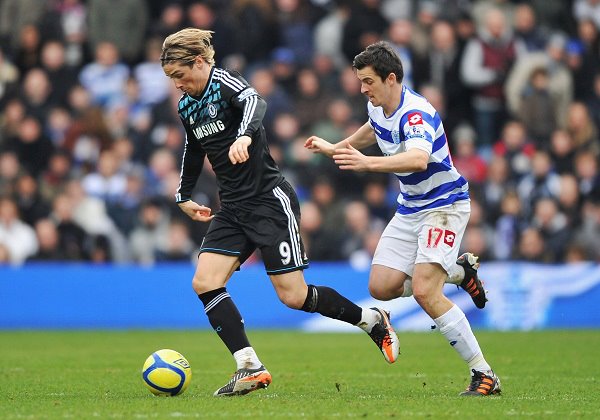
[tweetmeme]
Fernando Torres was one of the most anticipated transfers of recent memory when he made his £50m move from Liverpool to Chelsea in January 2011 – but to say his first year at the club was rough is an understatement. Even the untrained eye and casual fan know of the woes of Torres, but how bad is it? Let’s take a look at the stats…
Fernando Torres has played the full 90 minutes in 13 of the 38 Chelsea matches played this season. In these 13 matches Chelsea average 1.46 points per game (19 points total using 3 points per win and 1 point per draw as Cup competitions are not allotted points) – winning 5 matches, drawing 4, and losing 4 (38% win percentage).
In the 25 matches Torres has NOT played the full 90 minutes, Chelsea are averaging 1.8 points per game (48 points – winning 14, drawing 6, losing 5 – 56% win percentage), which is a 23% increase in points from when Torres plays the whole match and a 18% increase in win percentage.
Chelsea have scored 21 goals in the 13 Torres played from start to finish, or 1.62 goals per game. In the 25 matches Torres did not play the full 90 minutes, Chelsea have scored 48 goals, or 1.8 goals per game. The club has scored 11% more goals when Torres does not start and finish the match.
So the offense takes a dip when Torres is on the pitch for the full match but honestly it’s not drastically awful, especially when compared to before the Birmingham and Napoli matches when the percentages looked much worse (a staggering 40% point difference to 2.04 per game, 16% goal difference to 1.87 per game). It can be concluded though given the points statistic that the team does perform better when he isn’t on the pitch, but the notion Chelsea scores more when Torres doesn’t play is pretty inconclusive, especially given the sample size of only 13 games.
I have, however, saved the most shocking statistic for last – I don’t even know where to begin in explaining this one…
In the 13 matches this season Fernando Torres has played the full 90 minutes Chelsea have a goal difference of +2. In the 25 matches Fernando Torres has NOT played the full 90 minutes in Chelsea have a goal difference of +22.
This even includes matches Torres has played the full 90 in such as the 5-0 thrashing of Genk earlier in the season at home. A difference in goal differential of two times as much is shocking, five times is astronomical, but ELEVEN times?! Surely there has to be a correlation here between Torres playing and the Chelsea attack/defense faltering.
Most Chelsea fans are aware of the new Torres style – drop deeper and facilitate – but is his style of play forcing midfield and defensive players to push forward more? Are his teammates having to increase their workrate as build-up play and attacking the goal relies more on them (compared to Drogba)? Any insight you may have please, please let me know.
UPDATE 2/24 – I have calculated a plus/minus for Torres – Chelsea are +7 when he is on the pitch and +17 when he isn’t. You can view the full post at thechels.co.uk.
Torres goal and assist rates
Fernando Torres averages a goal every 362 minutes this season for Chelsea and an assist every 227 minutes. He scores or assists every 139 minutes.



